Peter MALONE
Saturday, 18 September 2021 19:55
Suskind
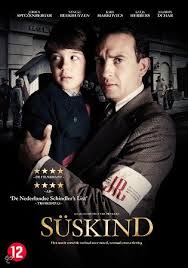
SUSKIND
Holland, 2012, 118 minutes, Colour.
Jeroen Spitzenberger, Karl Markowics, Katja Herbers.
Directed by Rudolf van den Berg.
The Suskind of the title is Walter Suskind, German born, but resident of Holland, a factory manager at the outbreak of World War II. He is Jewish, sees his foundry making swastikas and applies to the Jewish Council for a job. The Board, who enjoys something of a comfortable relationship with the occupying Gestapo, appoint him to the leadership of the Council, a job which he holds down for the year. He is married, with a daughter. Suskind is played by Dutch actor, Jeroen Spitzenberger.
The film shows the method of selecting Jews to be transported to Germany to work camps – although, it is later realised, that the journeys are to the concentration camps and death. Suskind maintains a relationship with the occupying Gestapo in the person of an official, by Karl Marcovics (The Counterfeiters).
Suskind’s main preoccupation was the saving of children, brought to him by distraught mothers, aided by his staff at the local theatre which has become the headquarters for the Council and the children. He is reported to have saved over 1000 children from going on the trains into Germany. . He works at great personal price, his difficulties and the choices to be made for the decision to go to Germany, the tensions with his wife, care for the children, the facade with the Germans. Ultimately, he and his wife were transported into Germany, the dying in the gas chambers, he on a forced march at the beginning of 1945.
This film as a tribute to him.
1. A picture of Holland during the war, German occupation, the military presence, the treatment of the Jews, oppression? The Jewish Council and its dealings with the Gestapo? The sending of thousands of Jews to the concentration camps? The saving of children?
2. The re-creation of the period, the town, factories, the theatre, the Nazi officers? The streets? The musical score?
3. The true story of Walter Suskind? His background, German, living in Holland, his wife and children? The German occupation? His work in the factory? The episode at the theatre, his trying to save the pianist, playing the piano? Observed by members of the Council? His visit to the Council, his false name, the interview with the Board, the observations and his being watched? His being offered the job? His relationship with his wife, love, her persuading him to take the job because somebody had to do it? His spending a year doing the job as head of the Council, the hardships for him, his relationship with family cotton, his anguish, concern for the children, saving them?
4. Aus der Funten, not wanting to be in Holland, obeying orders, superior officers, the emptying of the Dutch cities of Jews, the number to go by train each week for work experience, but really concentration camps? The lists, the reasons for people being crossed off the list?
5. Suskind, at the theatre, taking over? His looking at the lists? The criteria? The cavalier attitude of the Board, their liaison with the Nazis? Suskind and his realisation of the fate of the children?
6. The special efforts for the children, concealment, trucks, in bags, in boxes? The mothers, their desperation, the desperate mother and her fall from the roof? The mother having to become a prostitute for the SS? Suskind’s visit to her? The range of children, age, experience? The various concealment places, the theatre, basements?
7. The men rounding up Jews and selling them to the Council? The discovery of the children? Fanny Phillips and her attacking him to save the children?
8. Fanny Phillips, her work, the dangers, under threat, arrested, Suskind rescuing her from the train?
9. The German authorities, considering Van der Auten a wimp? His being deceived, sad that he was deceived? His believing in and enjoying the company of Suskind? The final confrontation, Suskind asking where his wife and daughter were? The officer giving him the carriage number?
10. Suskind’s wife, her growing desperation, wanting to leave? Her attacks on her husband? Her being arrested, their daughter? Her being used as a prostitute, her not saying anything, wanting Water to leave? His going to Amsterdam, to get the jewels from the grandparents? Discovering more children? Helping them? Going back, the German officer and the change of the deal? His desperation, finding his wife and child?
11. His various helpers, the man faking the documents, continued support? The singer, when there is only singing to do? The escape, machine gun fire?
12. The final information, wife and daughter gassed, Suskind dying on a forced march?
13. This film as a tribute to him and his work?
Published in Movie Reviews
Published in
Movie Reviews
Tagged under
Saturday, 18 September 2021 19:55
Gonzo: The Life and Work of Dr Hunter S. Thompson
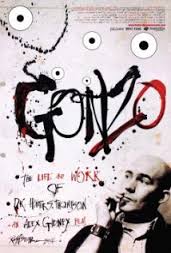
GONZO, THE LIFE AND WORK OF DR. HUNTER. S. THOMPSON
US, 2008, 120 minutes, Colour.
Directed by Alex Gibney.
Irrespective of the title of his films, director Alex Gibney has made two excellent documentaries that are well worth seeing, his expose of Enron, the Oscar-nominated Enron: the Smartest Men in the Room (probably all the more relevant in the current financial crises) and the Oscar-winning film about American torture in Afghanistan and Iraq, Taxi to the Darkside which is highly recommended.
Now he has taken on the famous, notorious, journalist Hunter S. Thompson, for whom the word 'Gonzo' was applied to his iconoclastic, anti-sacred-cows, hard-hitting journalism. How much of it was fuelled by his constant drug and alcohol consumption is hard to say but this film indicates quite a bit. But, he was a man who believed that writing could change the world. Thompson was a man of contradictions, hellbent on self-destruction (which culminated in his suicide by gunshot wounds in 2005) but hellbent on supporting the politics and politicians he approved of.
Gibney uses only Hunter's words thoughout the film, from audio tapes, film and television material. Johnny Depp reads his written words. Depp portrayed Thompson in the Terry Gilliam phantasmagoria, Fear and Loathing in Las Vegas, 1998), the visuals of which, in the monstrous fantasy style, by the drawings of his friend and collaborator, Ralph Steadman. He used fear and loathing as his trademark after his book, based on an actual journey, was published in 1971.
Thompson emerged in the later 1960s, through Rolling Stone magazine, with his targeting of American politics. This reached a climax in 1972, so the film shows us, with his campaigning for Democratic candidate, George Mc Govern, his starting destructive rumours (eagerly latched on to by the media irrespective of truth) about Ed Muskie. Needless to say, Thompson was anti-Nixon.
Thompson loved guns, a member of the NRA, and tried to be elected sheriff of Aspen. Contradictions.
There is a great number of interviewees in the film including Jimmy Carter, novelist Tom Wolfe and conservative Pat Buchanan who obviously still has a sneaking regard for Thompson.
Thompson's two wives also speak up, especially his first wife who has a mixture of exhilarating and bitter memories. His son also appears.
This is not just a portrait of a wildly eccentric journalist, a man of his changing times, but a close up of the mid-60s to the mid-70s. What the film does not explain is what happened to Thompson between 1980 and 2000. It seems as if he believed his own myths and publicity and carried on as a celebrity. There is some writing after 9/11 but, the film suggests he had passed his use by date and, after often talking about taking his life, he did.
Published in Movie Reviews
Published in
Movie Reviews
Tagged under
Saturday, 18 September 2021 19:55
California Mail

CALIFORNIA MAIL
US, 1936, 55 minutes, Black and white.
Dick Foran, Linda Perry, Ed Cobb, Tom Brower.
Directed by Noel Smith.
California Mail is one of the first of Dick Foran singing westerns. In fact, he sings only at the beginning and at the romantic end.
The setting is the 1860s, the end of the Pony Express era and the introduction of sending mail by Stagecoach. Foran plays a rancher, supported by his father, who puts in a bid for the new Stagecoach company after serving as a Pony Express rider. The Sheriff of Gold Creek decides that there should be a race on 4 July, through the most difficult part of the route for the Stagecoach. Foran and his father apply as does another old-timer. However, it is the Barton brothers who put in a bid, tamper with Foran’s stagecoach wheel which means that he crashes over a cliff. The buttons that the contract but also plan to rob the stagecoaches.
A rider is commissioned to hold up a coach and kills the heroine’s father. He has stolen Foran’s horse, the famous Smoke who appeared in most of the films, and disguised himself. Foran is blamed, goes to prison to await trial, escapes and persuades his father to talk with the bank manager to put a fake consignment of gold on a coach and observe the robbers. In the meantime, Smoke has trampled the initial killer who is then discovered, proving Foran innocent.
The finale is the coach going through the territory, attacked by Barton and his gang, discovering that the gold consignment was only rocks, and Foran and his father and the sheriff riding to the rescue.
And, of course, there is a conventional romance.
Published in Movie Reviews
Published in
Movie Reviews
Tagged under
Saturday, 18 September 2021 19:55
Empty Holsters
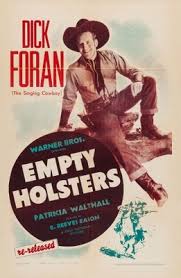
EMPTY HOLSTERS
US, 1937, 62 minutes, black-and-white.
Dick Foran, Patricia Walthall, Emmett Vogan, Glenn Strange, Wilfred Lucas, Tom Brower.
Directed by B. Reeves Eason.
Empty Holsters is one of many singing western starring Dick Foran, produced Warner Brothers in the mid 1930s. After singing in a band, he became an actor Warner Bros, but it was his popularity with audiences in these Westerns that helped him make his mark. They usually open with a song, as did this one with two other songs later.
Foran plays a cowboy riding with the cattle, singing, in love with the daughter of the town’s banker. However, there is an arch-villain in the town who is after the bank and after the girl. He arranges a stagecoach robbery, killing the two drivers, planting his own witnesses who lie in court that Foran is the robber. He is sentenced to 10 years but is released after five years for good conduct. When he returns one of the conditions for his parole is to hand over his guns to the sheriff – hence the title Empty Holsters.
When his father is threatened, he plans to ride to give the evidence to the marshal,but it is the 1890s and there is a telephone call by the villain undermining his visit. However, the villain organisers the robbery of a safe from the bank. There is confrontation, the fistfight and shootout.
And, of course, there is a romance between Foran and the bank’s daughter.
Published in Movie Reviews
Published in
Movie Reviews
Tagged under
Saturday, 18 September 2021 19:55
Adventurer, The: Curse of the Midas Box
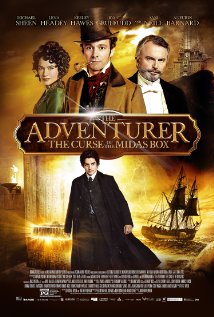
THE ADVENTURER: THE CURSE OF THE MIDAS BOX
UK, 2013, 100 minutes, Colour.
Michael Sheen, Lena Headey, Sam Neill, Aneurin Barnard, Keeley Hawes, Mella Carron, Xavier Atkins.
Directed by Jonathan Newman.
This is an adventure story, something in the vein of the film and television series of the Young Indiana Jones.
This time the young hero is Mariah Mundi (reminding us that traditional British names like Evelyn have been used by males). He is played by Aneurin Barnard, who played celebrated photographer, David Bailey, twice in We’ll Take Manhattan and Legend. His parents work in a British Museum and are experts on antiquities. When they are captured and disappear, it is up to Mariah to find them as well as the Midas box (which gives its own extraordinary powers) for which they had searched. In the action are the adventurer, Will Charity, played by Michael Sheen, and the arch villain played by Sam Neill.
There are adventures on a mysterious island, owned by the villain and managed by Lena Headey in cahoots with the villain. Mariah is also searching for his little brother discovered amongst a group of child slaves, working engines under the elaborate hotel (which would give the Grand Budapest Hotel run for its money for its exteriors and the design of the interiors).
Will Charity turns up disguised as a magician, confronts the villain, seems to be defeated, leaving Mariah to resolve all the problems.
With a shock revelation at the end about Mariah’s father, there was room for a sequel – but, it seems, this was not popular enough for the producers to allot the finance for the sequel.
1. An adventure film for young boys? For family? Parents? Adults?
2. The influences of other adventure films, films about young boys, Indiana Jones, Harry Potter…?
3. London in 1885, the London Museum, the streets, familiar scenes? The transition to the island? The extraordinary hotel, exteriors, interiors? The sea? The caves, the machines, the excavations? The adventure and musical score?
4. The title? The power of the box, transforming objects into gold – a weapon? See it in action at the end of the film? Destroying the villain?
5. The opening, Will Charity, confronting Lugar, the gas, the mask, Will left for dead, his emerging, his being shot? Going to the Museum, the lecture, Charles and Catherine? The two men intruding? The taking of the husband and wife, the mother putting the connections in the children’s pockets? Her final advice? Their going home, the home invasion, their escaping, jumping, going to the reformatory, the kerfuffle, their escape? The taking of Felix? Mariah with Will? The partnership?
6. Lugar, villain, avaricious, collecting objects, antiquities? The members of the Board of Antiquities for the government, pursuing Lugar, getting jobs at the hotel, the final confrontation?
7. Mariah, the map, the travel to the island, Monica and her rebuking him for the entry, his being a porter? Uniform? His room? His work, carrying the cases for the guests? His continually searching for Felix?
8. Sacha, sewing, friendship with Mariah, going home, stealing the food, her father’ anger? His later repentance, coming to her rescue, sacrificing himself?
9. Monica, her haughty attitude, working with Lugar, the staff, her arrogance? Her catching Mariah, their putting her in the cupboard, her emergence, announcing that the magician was a fake? Her death?
10. The magician, his manner, boasting, interaction with Lugar, his performance in the water, emerging among the audience? The guillotine, wanting to get the key from Lugar, Monica interrupting? His literal unmasking?
11. Mariah and Sacha, exploring, finding the caves, finding the ghostly monster, the vehicle, the children enslaved, Felix one of them? Their being drawn back into the whole? Seeing them at work, slaves? Mariah and the reuniting with Felix, taking?
12. The confrontation with Lugar, with Will, the shooting? The cave, the door, the keys shining indicating the box was near, Mariah giving it to Lugar? His using it to destroy people, on the vehicle, Will hanging over the cliff, Mariah using it on Lugar and his disintegrating?
13. The arrival of the officials from the Antiquities Department, the rounding up of Lugar’s men?
14. The awarding of the medals to the children? Mariah inviting Sasha to the house?
15. Catherine being tortured, the arch villain, signing the document, the revelation that he was Charles Mundi?
Published in Movie Reviews
Published in
Movie Reviews
Tagged under
Saturday, 18 September 2021 19:55
Dom Hemingway
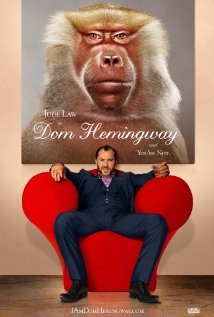
DOM HEMINGWAY
UK, 2013, 93 minutes, Colour.
Jude Law, Richard E.Grant, Demian Bechir, Kerry Condon, Emilia Clarke.
Directed by Richard Shepard.
While Jude Law has been a significant factor both on stage and on screen for several decades, his versatility has come to the fore during his 40s. He was the very restrained Karenin in the Keira Knightley version of Anna Karenina. He was a tough submarine captain in Black Sea. Here he is a safecracker who is taken the rap for an international criminal and served a prison sentence for 12 years.
The film opens with a tour de force monologue by Dom Hemingway, experiencing sex with a prisoner but all the time to claiming his prowess, especially his sexual prowess. Throughout the film, he keeps asserting himself that he is Dom Hemingway.
On release, he pals up with a close friend, played by Richard E.Grant. But he makes sure that he has a solid bout drinking and sex before he gets into further action, deciding to go to France with his friend to get the money he is owed by the criminal. At times he is uncontrollable, drinking, abusing the host, walking naked through the fields, apologising. Then, all of a sudden, there is a drastic car accident leading to Dom returning to London, especially to find his daughter, discovering her as a singer, her partner, and her child. Needless yo say, she wants little to do with him.
In the third part of the film,.Dom makes friends with his grandchild, visits the cemetery, makes some kind of peace with his daughter, and uses quite some shrewdness to get a little of his money back by meeting the gangster’s girlfriend in a London restaurant, kissing her, biting her ear – and biting off the expensive earring she is wearing.
A rough kind of film, but one, especially with Law’s performance, draws the audience in.
1. The title? The focus on Dom? His repeating “I am Dom Hemingway”? As a character, personality, his life, crime, career, prison, the good and bad?
2. British locations, prison, the streets, clubs, school, cemetery? The French locations, the countryside, the mansion? The musical score?
3. The initial impact of Dom himself, his long monologue, the sexual preoccupation, his progress, sexual activity, the prisoner? Further development of his character, the focus, his self-image, proud, power, sex? His language, crass, articulate, Shakespearean, his vocabulary, his rhetoric?
4. The chapters and indication of events and focus, tone?
5. In prison, at the opening, the meal, response to the guard, his getting out, going to the garage, bashing the mechanic because of his wife, being greeted by the others? Going to find Dick, their talk, the girls, sex, his drinking, the morning after?
6. Dick, his style, reticent, his partnership with Dom, crime, the passing of the years, the friendship, the loss of his hand and Dom not noticing? Travelling to France?
7. France, the countryside, seeing the girl on the bike, Ivan’s girlfriend, being welcomed by Ivan, Dom taking the rap for him, their talk, his drinking, bluntness, wanting the money? The meal, his talk, apologising? At home, yet feeling alien, the nude walk, Dick and his persuasion?
8. The ride, his standing in front of the car, reckless, the crash, the dead, Ivan being speared? The girl driving off with the cash?
9. Going back, possibilities, wanting to see his daughter?
10. The encounters with his daughter, finding her son? Going to the home, her partner, the African men, singing in the club? His visit?
11. The changing relationship, his daughter talking to him, her son? Going to the cemetery, the boy at the grave, their future?
12. Tour-de-force performance from Jude Law?
Published in Movie Reviews
Published in
Movie Reviews
Tagged under
Saturday, 18 September 2021 19:55
A.C.O.D.
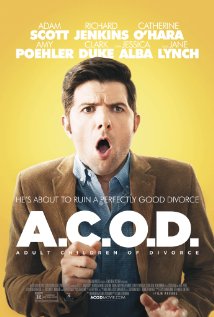
A.C.O.D.
US, 2013, 88 minutes, Colour.
Adam Scott, Richard Jenkins, Catherine O' Hara, Amy Poehler, Mary Elizabeth Winstead, Clark Duke, Ken Howard, Valerie Tian, Jessica Alba, Jane Lynch.
Directed by Stuart Sticherman.
A.C.O.D is an acronym for Adult Children of Divorce. The film works on the premise that the present adult generation has not experienced stable family background, experiencing the effect of their parents’ divorce. During the final credits there are many quick interviews with a range of people, some saying how much the divorce had affected them, others saying that it did not have much effect at all.
While the theme is serious, it is treated with something of a light and comic touch. It has a very strong cast, with such comic actors as Amy Poehler, Jane Lynch, and serious performers who can do comedy as well, Richard Jenkins and Catherine O’ Hara. Adam Scott, Mary Elizabeth Winstead, Jessica Alba represent the younger generation.
Everything is seen from the point of view of Carter, Adam Scott, who was interviewed as a child by a researcher, played by a sardonic Jane Lynch, who then wrote a book about these children, not identifying them. While Carter is bemused by the continued quarrelling of his father and mother, their second marriages, their inability to be in the same place at the same time, he faces a crisis when his younger brother decides to get married and wants them both at the wedding.
Carter has been in a four-year relationship with Lauren, Mary Elizabeth Winstead, but has not found the strength to propose. Her parents have been in a stable relationship, celebrating their anniversary with great gusto every year – the 37th in the film.
Richard Jenkins and Catherine O’ Hara are persuasive and their antagonistic scenes – and then shocking the audience by starting up their relationship again. This has repercussions on their respective spouses, Amy Poehler and Ken Howard.
Carter gets continually more involved, discovers the book reads it, is interviewed further by the researcher, and breaks off his relationship with Lauren.
It builds to a finale at Lake house, everybody turning up and the house guy up in flames. The film is realistic in his portrayal of the troubles of the younger generation – but there is some hope at the end.
1. The title, the acronym? Audience interest? audiences who identified with the characters?
2. A contemporary story, the generation of divorce, different parenting, absence of parenting?
3. The strong cast, character actors?
4. Carter’s story, when a little boy, the films, the pictures, his relationship with Trey, Carter’s care of his brother, the relationship with the parents, divorce, the many clashes, issues of custody, visits, the holiday house, Carter at nine, the trauma, his parents telling the story as about Trey? Therapy, the visits to Dr Judith? The repercussions? Her writing the book?
5. Trey, young, freer than Carter, his girlfriend, Japanese, their love, together, the decision to marry? Telling Carter, the wedding plans, precipitating the crisis with the parents?
6. Hugh, as a father, failure, womaniser, his clashes with Melissa, the arguments? His marriage to Sondra, the children, happy, playing with them, acting like a father? Sondra checking on him, his relationship with each of his sons?
7. Melissa, character, fighting, dominant, the marriage and failure, and the marriage? Both refusing to be in the room with each other?
8. The new spouses, Gary, easy-going, the cheque for Trey, enjoying fishing, going to the house, talking with Carter, the failure of his previous marriages?
9. Sondra, owning the site of the restaurant, Carter disliking her, calling her Cuntessa, the children, going to the reunion, phoning and checking?
10. Carter, his life, growing up and success, the restaurant, running it effectively, the staff, the customers, the lease and Sondra? For years with Lauren, her not having a key, and no proposal, his not telling her about his past, the encounter with Dr Judith, reading the book, identifying Carter as Rick? Her parents, the long marriage, the party, Carter and his tension, kneeling with the proposal, only asking to make it legal? Refusal, separation, coming to the book launch, going to walk, reunited?
11. The scenes with Hugh and Melissa together, the reactions at the table, Carter trying to tell them to behave? The sexual encounter, Carter discovering them? Their lives? Telling Trey, his telling everyone?
12. The Japanese meal, both parents arriving, the behaviour, Carter and his sulking, going out, his parents going out to reprimand him, send him back in?
13. Dr Judith, Carter’s visit to her, the talk, not knowing about the book, the bookshop, reading it, realising he was Rick? (And Lauren identifying him as
Rick? His return to Dr Judith, the arguments, in the street, the client and his discussions with him and realising he was Rick, Carter’s resentment, Michelle, their talking, with the older husband in the bar? His collecting the boxes from the garage? Taking them to Dr Judith, her returning them, the proposal to write the new book, his reaction?
14. Carter as a character, his angers, his parents, intervening, interfering?
15. The wedding, the preparation, the fittings for the suits, his anger, Trey and his reaction, the wedding off?
16. The clash with Sondra, the terminating of the lease?
17. Going to the house, Trey and his girlfriend, Gary and his going fishing, the visits of Hugh and Melissa? Sondra and the children? Carter’s cleaning up, the fire, the cigarette butt, the house going up in flames, the reactions? Carter buying it?
18. Dr Judith and the book launch? Carter there?
19. Happy ending, the wedding, reconciliations, hopes?
20. The final credits and the personal interviews, so many as the adult children of divorce, some not?
21. The tackling of the serious subject through irony, through humour?
Published in Movie Reviews
Published in
Movie Reviews
Tagged under
Saturday, 18 September 2021 19:55
Veronica Mars
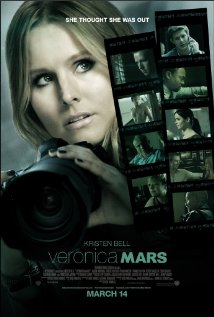
VERONICA MARS
US, 2014, 107 minutes, Colour
Kristen Bell, Jason Dohring, Enrico Colantoni, Chris Lowell, Tina Majorino, Kriysten Ritter, Martin Starr, Gaby Hoffmann, Jerry O'Connell, Jamie Lee Curtis.
Directed by Rob Thomas.
Veronica Mars was a very popular television series in the first decade of the 21st century. It was a star vehicle for Kristin Bell who returns in this cinema remake, which was financed online by crowd-funding.
Veronica is in New York, being interviewed after her legal studies for a prestige job in the city, interviewed by Jamie Lee Curtis. When a friend from the past, who has been in a relationship with a singer who was with them at school, is accused of her murder, she returns back to California, reunited with her father, former policeman who is now a private eye. The sheriff, heading a corrupt unit, is hostile.
While there is a romantic aspects, the film is basically a murder investigation, probing into the past, turning up secrets from the present.
Which means that it is a popular entertainment, an expanded version of episodes of the television series, written and directed by its creator, Rob Thomas.
1. The popularity of the television series? The young private investigator? The characters and situations, investigations?
2. Cast, from the television series, developing their stories, expectations?
3. Background the city of Neptune? Veronica’s father in the police, police corruption, his being ousted, becoming a PI? Her relationship with her father, friends, relationships?
4. Veronica in New York City, the job interview, her studies, hopes, the law?
5. The news of the murder, her friend the singer, her career? Her relationship with Logan? His being a suspect? The call, the plea?
6. Logan meeting her on her return? Her father’s reaction, her reputation, the critics? Logan’s story? Her relationship with Piz, his radio work, the bond?
7. Her staying, the discussions, the investigation?
8. The corrupt police, the sheriff, his attitudes, paying off the police, then going into action, cover-ups?
9. Meeting her friends, the couple, meals, discussions, at the reunion, his turning off the video, his past membership of the gang, the police harassment, the gun, his being framed?
10. Her not wanting go to the reunion, her presence, people’s reaction, the dance, screening of the video? The range of characters, the murder, the clues, the boat, death on the boat, the Serendipity? Logan, his housemate, Dick? Gia and her marrying into politics?
11. The memories of the night, the various versions, the heavy drinking, the drowning, the issue of the anchor? Bonnie, witnessing the events, her loose
talk, her being murdered?
12. Veronica following the clues, photos and the anchor, year, observation, Colby, the sexual encounter with Gia, Gia’s plans for her fiance and politics?
13. Veronica watching from the warehouse, confronting Gia, the story of blackmail,Colby? Sexual payment?
14. Colby, his attack, his story, Veronica using her wits to confront him?
15. The solution, the relationship with Logan, Piz and his coming to the reunion, his anger, and her not returning to New York, his parents at the airport?
16. Her decision to stay in Neptune?
Published in Movie Reviews
Published in
Movie Reviews
Tagged under
Saturday, 18 September 2021 19:55
Attack, The
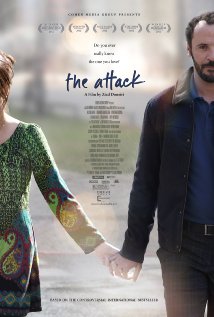
THE ATTACK
Israel, 2013, 102 minutes, Colour.
Ale Suliman, Reymonde Amsallem.
Directed by Ziad Doueri.
The Attack is a provocative film, coming from Israel but showing the situation between Israel and Palestine, the possibilities of working together, the reality of suicide bombers and the consequences for both sides.
A Palestinian doctor, working at a Tel Aviv hospital, is given an award. His wife cannot be present but he speaks to her on the phone. She has allegedly travelled north to visit family.
The suicide bomber attacks an Israeli target, killing a number of people. The doctor and the staff tend the victims. It emerges that the doctor’s wife is amongst dead and it soon becomes clear that she is the suicide bomber. The doctor is taken, interrogated, under suspicion despite his reputation.
After being released, he travels to the north, questioning the family, questioning contacts and finally realises that it is the truth, and is amazed and angry that his wife would this from him.
The film was well acted, dramatic in its presentation of the suicide bombing situation and the consequences. And, as always, it raises questions of whether they can be independent record between Palestine and Israel, or the possibility of a Palestinian state.
1. The title, its tone? In the Israel- Palestine conflict?
2. The work of the director, in Israel, his experience in the United States? His perspective on characters, on the issues? Presenting both sides?
3. The locations, Tel Aviv, the auditorium and reception, the hospital, the bomb situation, homes, interrogations, the visit to the West Bank, locations and people? Musical score?
4. The story from Amin’s point of view? Living in Tel Aviv, his Israeli friends, accepted, his work in hospital, his long career, surgeon, receiving the award, the acclaim, his speech? The brief phone call from his wife, its later being used against him?
5. The terrorist bombing, the dead, his working in the hospital? News that his wife was amongst the dead? His not understanding, the explanation that she was away from the city? Reactions against him, Israelis not wanting him to operate on them?
6. Shin Bat and his being taken, the interrogations, the severity, hostility, his bewilderment, denials? The emerging facts? The phone call, his wife’s lies? The flashbacks and his memories?
7. Reaction from his colleagues, the sympathetic colleague and the visits, her support?
8. Hostility in Israel, from Palestinians, the trashing of his house?
9. The evidence, his coming to believe the truth about his wife? His puzzlement?
10. His decision to go to find out for himself, going to her relatives, the explanations, the relative who came after the bombing to ask for money, his wife’s links to the terrorists? The range of people in the West Bank and their comments, some hostility, fearing that he was an agent of the Israelis, suspicious?
The psychological effect on him? Emotional?
11. The message from his wife, her loving him, her explanations, and the motivation for the action?
12. Insight into the mentality and activities of suicide bombers?
13. The film banned by the Arab League and the condemnations of right-wing Israelis?
Published in Movie Reviews
Published in
Movie Reviews
Tagged under
Saturday, 18 September 2021 19:55
Justin and the Knights of Valour

JUSTIN AND THE KNIGHTS OF VALOUR
Spain, 2013, 90 minutes, Colour.
Voices of: Freddie Highmore, Antonio Banderas, Alfred Molina, Charles Dance, Saoirse Ronan, James Cosmo, Tamsin Egerton, Rupert Everett, Barry Humphries, Mark Strong, David Walliams, Julie Walters, Olivia Williams.
Directed by Manuel Sicilia.
Justin and the Knights of Valour is a Spanish animation film, produced by Antonio Banderas. It has an excellent English voice cast.
Freddie Highmore voices young Justin, who lives in a society where the Knights have been excluded and the police are rigidly law- bound. His father (Alfred Molina) wants him to be a lawyer, but his grandmother (Julie Waters) supports his quest. He is also infatuated by very self-centred young lady.
As he goes on his travels, he stays at an inn when he meets a feisty waitress, Talia (Saoirse Ronan) who helps him in his adventures. He seeks the advice of three wise characters, voiced by Charles Dance, James Cosmo and Barry Humphries. In the background is the rebel who wants to take over the kingdom (Mark Strong) with his exceedingly campy offsider (Rupert Everett). There is also a dim knight who taunts Justin (Banderas himself). The Queen who puts everything right in the kingdom, reintroducing the Knights, is voiced by Olivia Williams.
Very colourful, action and adventure, patches of romance.
1. A family film? The response of children? Boys, girls? Ages? Entertainment for adults?
2. The computerised animation, the artificiality of the characters and their expressions, layouts, costumes and decor?
3. The quality of the voice cast, the British cast?
4. The Spanish production, director, finance, yet more British than Spanish in perspective?
5. Justin, his voice-over, the story of the kingdom, the expelling of the Knights, his grandfather and his fight with Sir Heraclio, his father as the legislator, the queen signing the law, Justin and his admiration for his grandfather, his father wanting him to be a lawyer, his not wanting this?
6. The illustration of the administration of the law, strictness, the interview with the fireman while the house was burning, the taking of the cat, yesterday’s bread for sale – and Justin using the bread to break the lock to free the cat and hitting the official and knocking him out?
7. Justin at home, the strictness of his father, upholding the law, telling his son he wanted him to be a lawyer? The boy and his resistance? Going to his grandmother, his grandfather’s sword? Her urging him to a mission? His decision to go, writing the note for his father? Going to see Lara, her trying on clothes and talking to the dressmaker while Justin thought she was talking to him? His taking her sock as a pledge?
8. The journey, the inn, the innkeeper, his strong men, the fights, Talia and her Irish accent, tough, working in the inn, the response to Justin, urging him to go?
9. The search for a magician, Melquiades, his comic voices, his split personality, the two personalities arguing with each other? His accompanying them, his later spells, for healing, for finding the castle like a water diviner, how humorous?
10. Justin, finding the castle, Legantir, tall and serious, taking just into the castle, meeting Blucher, meeting Braulio, his request, knowing his grandfather’s story, the decision to do training, the exercises, unleashing the dragon on him, the crocodile with the fire, Braulio and his controls, Justin not succeeding? Yet
the three and their liking for Justin?
11. Justin’s return, going to the inn, Talia and the vain knight, his unwanted attentions?
12. Justin returning for Lara’s reception, her entry, vanity, with the vain knight, Justin and Lara and Talia? The conversation, the dancing, the arrival of spirit and his gang, the comedy, the abduction? The stupid knight and his deciding to abduct Lara?
13. The fickle night who killed Justin’s grandfather, Soto as his assistant, going to the prison, freeing the prisoners, getting an army, the threats to the kingdom, his wanting the throne, the eventual confrontation with Justin? The sword fight, his grandfather sword, on the treadmill, the knight falling, Justin surviving?
14. The quest to find Lara, Melquiades and his help? The cowardly vain knight?
15. Justin, his achievement, with Talia, the sword, the Queen and the audience, the restoration of the Knights, the knighting of Justin, his father’s hesitation, signing the legal document?
16. And happy ending for all?
Published in Movie Reviews
Published in
Movie Reviews
Tagged under